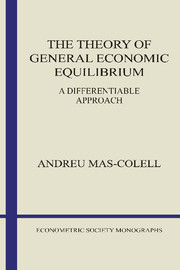7 - Exchange economies with many traders
Published online by Cambridge University Press: 05 January 2013
Summary
We saw in Chapter 5 that the Walrasian allocations of an economy are optima or, in more descriptive terms, that they exhaust the gains from trade. The converse is, of course, not true. This raises the following question: Among the optima, which further properties characterize Walrasian equilibria? This chapter is devoted to investigating this problem in the context of exchange economies. Under the hypothesis of a continuum of agents we shall obtain a number of important results. In Walrasian theory individual agents optimize with respect to price vectors given independently of their own actions. Hence, the proper reference framework of the theory is one where single agents lack any macroscopic significance. The continuum hypothesis embodies this requirement, and it is thus natural that it should be an essential ingredient of a characterization of equilibria.
In Section 7.2 we shall offer precise definitions for the following three properties of an allocation x:
(i) No group of traders can allocate their initial endowment vector among themselves in a manner unanimously preferred (core property);
(ii) no individual trader would be better off with the net trade of any other trader (anonymity property); and
(iii) individual agents appropriate all the gains from trade they contribute (no-surplus property).
- Type
- Chapter
- Information
- The Theory of General Economic EquilibriumA Differentiable Approach, pp. 263 - 315Publisher: Cambridge University PressPrint publication year: 1985



